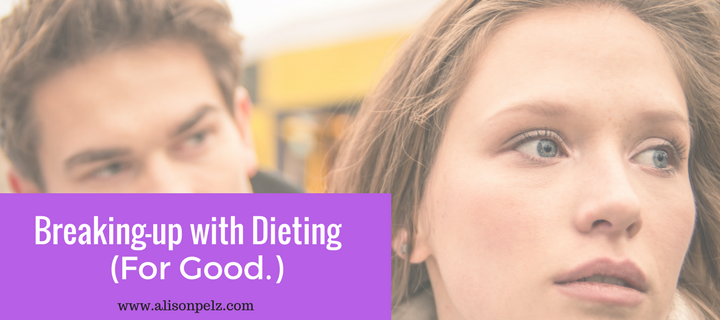Starting a new diet can feel like starting a new romantic relationship—exciting, hopeful, and thrilling at first. Dieting promises that when the weight is lost, life will really begin.
The reality of dieting.
Just like a new relationship, starting a new diet usually feels really good. There is ease in following a new diet because you don’t have to feel preoccupied about what to eat. While there is effort in planning meals, there is this sense of relief that goes along with it. This dieting euphoria can last for a while. Just like a new relationship, starting a new diet usually feels really good.
But unlike starting a new relationship, dieting almost always turns out bad (Dieting has a 95% failure rate long term). Life sets in and the diet begins feels too restrictive. The diet can make social engagements harder to navigate. The scale may not reflect your efforts. Or you biology might take over and you might feel just darn-right hungry. You may “go off the diet,” not because you lack willpower, but because the diet is just too restrictive.
Dieting involves following a set of external rules about how to feed yourself. Would you follow external rules when choosing a mate?
And just like a “bad” relationship, dieting can leave you feeling worthless and shameful and can undermine your self-confidence because your biology just can’t hack the diet (again, not because you lack willpower, but because of dieting is an ineffective intervention). Unlike a relationship, our society tells us that not being able to follow a diet is some personal failing.
Motivation to go on a diet can start with the intention of improving health. But dieting can have the opposite effect. Dieting is a risk factor for developing problematic eating behaviors, such as binge eating, purging, unhealthy exercise habits, and even full-blown eating disorders.
If you choose a bad mate, hopefully, you break off the relationship. But often with dieting, you keep going. That is what our culture tells us to do—just try harder.
Image what your life would be like without dieting.
When contemplating a breakup with a partner, deep down inside, you may wonder “What if I can’t find anyone else? What if this is good at it gets?” Once you break off the relationship and the sadness wears off and the wave of grief is surfed, you realize you are better off. You find yourself connecting with friends, family, enjoying hobbies, and dating again.
You realize that your life is better off without that relationship, and that yes, in fact, there will be others.
Giving up dieting will feel the same way. You will experience loss of what “may have been” if you had met that magic number (your weight loss goal). You will experience feeling torn between giving up dieting and pursuing that dream of weight loss. Maybe you were able to lose weight in the short term, but gained it all back. Remember re-gaining the lost weight is not because you are flawed, but because the intervention of dieting is ineffective.
You may experience feelings of isolation because it is normative to diet, talk about it, and post about it on social media.
If you do stop dieting, your weight may fluctuate or it could stay about the same. Everyone’s body is different. Eventually, your body weight will stabilize.
But you will definitely gain the following if you stop dieting:
1. Less preoccupation with food. You will most likely stop thinking about every morsel you put in your mouth, stop over-planning what foods to eat, and stop calculating how much food and what type to eat when.
2. Less guilt for eating. Your body needs fuel to survive. Food is our fuel. Diets are made up of a set of strict and often unobtainable rules, and when the rules are broken, guilt sets in. Guilt makes us feel bad, which doesn’t really help us take care of ourselves.
3. Reduced risk of developing a full-blown eating disorder or other problematic eating behaviors. Studies have shown dieting is a risk factor for developing an eating disorder.
4. Reconnection with exercise in a holistic way. Oftentimes, exercise is paired with dieting, and when the dieting stops, the exercise stops. Movement provides so many benefits, such as stress relief, reduction of anxiety and depression, pain relief, recreation, and community. Often when exercise is paired with dieting, it becomes a dreaded task or punishment, disconnecting us from the ways in which exercise can feel good.
5. Reconnection with food. Instead of using strict guidelines of a diet to guide your food choices, you can use your internal wisdom to guide your food choices. That is to say, you can eat foods that you like, notice how different foods affect how you feel, and begin to notice your hunger/fullness cues.
Tips to stop dieting:
During a break-up with a partner, often a little extra support is helpful. The same goes for breaking up with dieting. The following tips can support you in your non-dieting journey.
1. Books such as Intuitive Eating, Intuitive Eating Workbook, and Health at Every Size.
2. Listening to non-dieting podcasts.
3. Professional help from a therapist or dietitian experienced with the non-diet approach to eating.
If you live in the Austin area, please call for a free 15-minute phone consultation at (512) 293-5770.


